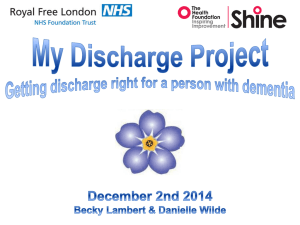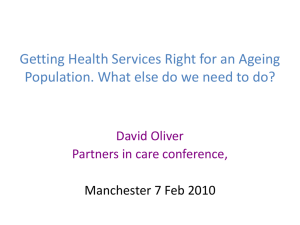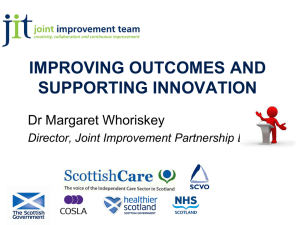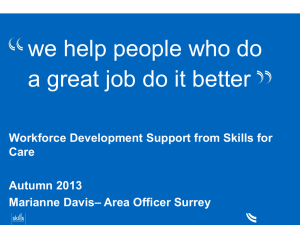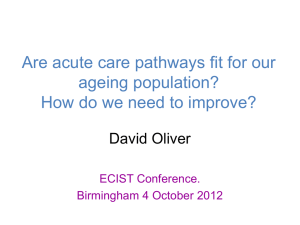Dignity in Care. Next Steps for Policy?
advertisement
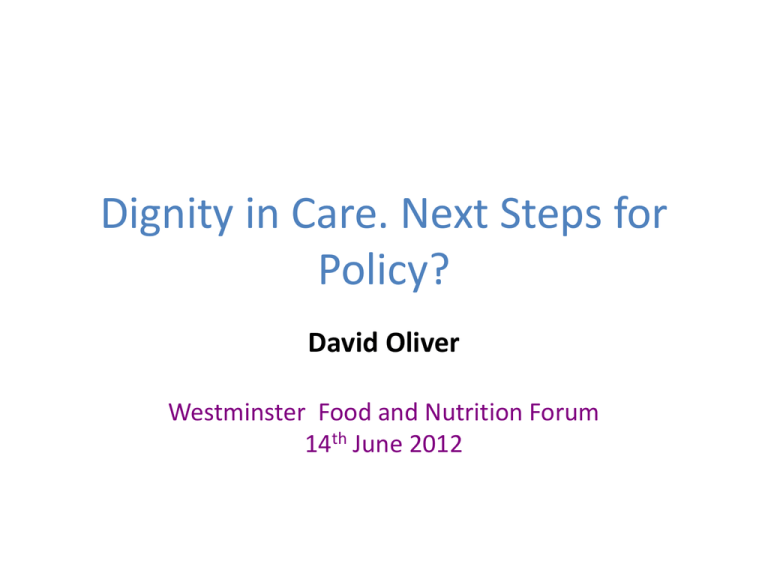
Dignity in Care. Next Steps for Policy? David Oliver Westminster Food and Nutrition Forum 14th June 2012 I: Setting the Scene. What do we already know? What’s going wrong and why? Ageing, health and services • Population ageing in England • Unhelpful, polarised attitudes • What ageing means for health and wellbeing – The good news (and wider psychosocial factors) – Most older people are not miserable, ill, dependent or institutionalised! – The bad news • What this means for health and care services – “Older People R us” – Including many with complex needs Services fit for ageing population? • Much great practice to celebrate/spread • Many satisfied customers • High ranking on several international indicators • Not all doom, gloom, sensation and scandal • Growing interest in rebalancing towards: • Prevention, Proactive LTC Care, Integration • So old not in hospital or long-term care for wrong reason Quality in Services for Older People? • Experience.....(more in a moment) • Outcomes/evidenced-interventions to deliver them – e.g. national audits/reports on continence, fractures, falls, nutrition, dementia, peri-operative care, CPR etc • Safety – e.g. Falls, pressure sores, hospital infection, drug errors, inpatient mortality, preventable delirium, hospital discharge • Efficiency & variation • e.g. Atlas of variation in NHS and in Social Care, Audit Commission Report on Health and Social Care Interface, Delayed Transfers, Hip Fracture Database, Admission Rates, Placement Rates etc • Continuity/Integration – Reports on bewildering experience from patient/carer perspective (e.g Glasby J “care transitions”) – Reports on problems for whole systems (Future Forum, Kings Fund) – Dis-integration, poor continuity is “lose/lose” for people and systems Ageism/Age Discrimination • Overwhelming evidence • e.g. Centre for Policy on Ageing Reviews 2009 • e.g. Equality Act Consultation • e.g. Surveys of managers, nurses, doctors • • • • • • System incentives and priorities Attitudes and behaviours Balance of training, education Conditions of ageing relatively neglected Worse access to care in older with same condition Older people with functional problems/frailty written off as “social”, “acopic”, “inappropriate” , “medically discharged” etc instead of being properly assessed, diagnosed • A point not to lose….older people need a diagnosis and skilled, multidisciplinary care. Stop the false distinction between medical and “basic nursing” care. Many wouldn’t be so dependent if the right thing done for them by staff with right skills. Back to …“Experience” • Biggest issue affecting dignity • Our starting point must be: • “What do older people and their carers say they want in their own care?” Dignity in Older Europeans (Woolhead) 400 older people. (Themes mirrored in 500 under 65s) • Dignity of identity – – – – – – – – – Maintain self respect Undermined by disrespectful address or labelling Attitudes of staff or family Neglect of appearances and clothing Exposure Lack of privacy in personal care and mixed wards Toileting Nutrition (and assistance with feeding and drinking) Care when suffering or dying • Autonomy – Retain independent control over lives for as long as possible – Even where need for nursing home, can still be kept clean and tidy • Human rights – Importance of being treated as an equal, regardless of age – Fighting discrimination – Choose how you live and how you die (including advanced decisions) Put another way…an “I” statement • • • • • • • “I want to be treated as a person, not an object” “I want to feel in control of my care or treatment” “I want privacy when washing, dressing, toileting” “I want help with eating and drinking” “I want my condition to be taken seriously” “I want to receive the best treatment available” “I want to be spoken to politely, but not patronised” Family Carers’ priorities? e.g. RCPsych Audit of Dementia Care in General Hospitals 2011 • Care planning and support in relation to the dementia (i.e. not just the acute condition) from admission to discharge • Care of patients with acute confusion • Maintaining dignity in care • Maintenance of patient ability in hospital • Communication and collaboration • Information exchange • End-of-life care • Ward environment • Mirrors Patients’ Association C.A.R.E campaign Patients Association CARE Campaign • “As a minimum, all patients should get assistance when they call for help, encouragement to eat and drink, assistance with going to the toilet and have their pain addressed” • Communicate with compassion • Assist with toileting, ensuring dignity • Relieve pain effectively • Ensure adequate nutrition End of Life Care Help the Aged. “Dying Matters: Listening to Older People” • “I want to die at home if that is my choice” • “I want to be told if I am terminally ill” • “I want to make things easier for my family and friends” • “I want to die with my loved ones round me” • “I want to die with dignity” • “I want to die free of pain” • “I want choice, information and control” But we don’t always deliver on these • 2008 All parliamentary enquiry into older people in health and social care • • • • – “A disturbing picture, requiring an entire culture change” NHS Ombudsman’s report “care and compassion” 2011 Patients association report CQC Dignity and Nutrition Inspections 2011 Various reports on dementia care in general hospitals 2010/11 (e.g. “counting the cost”, RCPsych audit • VOICES survey on end of life care • Francis Report on Mid-Staffs... • Common issues: Dignity, nutrition, communication, respect, information, continence, privacy, discharge from hospital, end of life care, pain relief, dementia care, attitudes Evidence on underlying reasons e.g. (addressing these can deliver change) • • • • Leadership (“ward to board”) Culture, values, attitudes Skills, knowledge Making it easier to do the right thing and harder to do the wrong • Organisational support/barriers “Counting the Cost”, Dementia in Hospitals 1,291 carers, 657 nurses, 479 ward managers PANICOA. “Dignity in Practice” Tadd W et al 2011 • Detailed interviews with 40 older people – recent discharged, 25 carers • In depth interviews with 79 frontline staff and 32 managers • 617 hours care observation, 16 wards 4 hospitals. Key Themes: • • • • “Whose interests matter?” “Right place wrong patients” “Seeing the person in the bed” “Influences on dignified care” • Recommendations... • Training Videos “a tale of two wards” RCN Report on nurse staffing • 9-10 RNs patients per RN on older people’s wards • 6.7 on adult medical or surgical • 4.2 on children’s wards II: Moving Forward. How could we get better? Not all about policy or “the centre” Also clinical, professional, organisational leadership Death by awareness?/Groundhog Day? • “I’m drowning here and you’re describing the water” • Melvin Udall. “As good as it gets” • We have ample evidence already on: – – – – – What older people and their carers want What good practice looks like Good service models to deliver it What’s going wrong Why ? • Lets focus on solutions, solutions, solutions Toolkits, campaigns and guides We have had endless toolkits and guides on dignity per se Constructive Solutions, relevant to 2012 no one “silver bullet” • “For every complex human problem there is a solution which is simple, obvious and wrong” • H L Mencken • We need to tackle the problem from several angles... • Stop reducing everything to hospitals, nurses, “basic care”, nurse-bashing, nursing degrees, SENs “accountability” and “matron” • Challenge the idea of a “golden age” Generic Solutions.... • • • • “Blue sky” Beyond politics, any system, any government A question: “What is the necessary/sufficient role of government, policy and “the centre” (including arm’s length bodies such as commissioning board, NICE or regulator)?” • What has to be delivered by others? Only 6 of 41 recs for government • Recommendations for: – – – – – – – – – – – – – Hospitals Nursing/Res Homes Systems Universities Educators Professional Bodies Regulators Leaders DH Wider government Commissioners Professions Advocacy Groups • Recommendations for: – Senior Leaders – Team Leaders – Professional bodies/societies – Policy makers, government, NHS commissioning board – Think tanks and commentators Dr Oliver’s Generic Prescription: Non-government – driven “bottom-up” • Systematic involvement older people/carers – Training, Designing Services, Evaluating, Care-giving • Education, training, skills – So staff have the right skills to look after largely older patients • Workforce in place to give care in right setting • Focus on prevention/LTC/earlier support – so older people only in hospital or care home when they need it • • • • Good practice guidance Dissemination of good practice models Facilitate implementation Professional and Clinical Leadership and Accountability – Colleges/Specialist Societies, Providers, Commissioners, Leaders in organisations • Transparent performance data inc. satisfaction/complaints • Advocacy, campaigning from charities /think tanks etc D.O. Generic prescription for policymakers/”the centre” • • • • • • • Effective regulation, inspection Follow-up with improvement plans System rules, standards and incentives Targeted/themed programmes or investment Older people = key to efficiency challenge Use of Law Focus, scrutiny, momentum from politicians Not just platitudinous “motherhood and apple pie” • These approaches can really deliver change • Live examples in NHS include: – Hip fracture – Dementia in hospitals – Stroke NHS Operating Framework NHS Commissioning Board and Outcomes Frameworks We will have several outcome indicators, quality standards etc relevant for older people, dignity, experience etc Duty of quality 7 NHS OUTCOMES FRAMEWORK Domain 1 Domain 2 Domain 3 Domain 4 Domain 5 Preventing people from dying prematurely Enhancing the quality of life for people with LTCs Recovery from episodes of ill health / injury Ensuring a positive patient experience Safe environment free from avoidable harm 2 Duty of quality Duty of quality 1 NICE Quality Standards (Building a library of approx 150 over 5 years) 3 Commissioning Outcomes Framework 6 4 Commissioning Guidance 5 Provider payment mechanisms tariff standard contract CQUIN Commissioning / Contracting NHS Commissioning Board - Specialist services and primary care GP Consortia – all other services Duty of quality QOF Nursing & care, quality forum. Themes... • “Leadership” • “Culture and values” • “Involvement and feedback” – Inc “friends and family” test • “Time to care” • “Energising for excellence” • “Commissioning for quality care/experience” Other Policy.... concerted action • National CQUIN programme – Dementia, Safety Thermometer • • • • • • • • • • • • • • • . Focus on discharge. post discharge care, readmissions Monies for re-ablement/delayed transfers/social care Best practice tariffs (e.g. Hip Fracture) Development of whole year of care payments and new RRR tariff National clinical audit programmes Transparency in data NICE guidelines and Quality Standards CQC role (inc. 700 further DANI inspections) National Dementia Strategy (and priorities in care settings) End of Life Care and LTC strategies Ongoing work on integration Social care reform and Dilnot commission NHS Constitution – rights, responsibilities, transparency, whistleblowing Equality Act Age Duty Human Rights, Mental Capacity Acts What next? • Will this momentum… • And response to Francis report • And professional leaders – e.g. Age UK/NHS Confed “delivering dignity” – e.g. RCN work on dementia – e.g. RCP Quality Mark work – e.g. Patients Association “partners in care” • Deliver measureable change? • Or a feeling “out there” that things have improved? No room for defeatism. There is plenty we can do to improve care for our older patients. • And remember, it could be us or our loved ones • Thank You • David.Oliver@dh.gsi.gov.uk • David.Oliver.1@city.ac.uk

